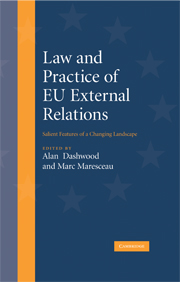Book contents
- Frontmatter
- Contents
- Abbreviations
- Notes on contributors
- Acknowledgements
- Introduction
- PART I Constitutional and institutional questions
- 1 Direct effect and interpretation of international agreements in the recent case law of the European Court of Justice
- 2 Defining competence in EU external relations: lessons from the Treaty reform process
- 3 Article 47 TEU and the relationship between first and second pillar competences
- 4 EC law and UN Security Council Resolutions – in search of the right fit
- 5 Fundamental rights and the interface between second and third pillar
- 6 The EU as a party to international agreements: shared competences, mixed responsibilities
- 7 The Common Commercial Policy enhanced by the Reform Treaty of Lisbon?
- 8 The extent to which the EC legislature takes account of WTO obligations: jousting lessons from the European Parliament
- PART II Bilateral and regional approaches
- PART III Selected substantive areas
- Table of Treaty Provisions
- Index
7 - The Common Commercial Policy enhanced by the Reform Treaty of Lisbon?
from PART I - Constitutional and institutional questions
Published online by Cambridge University Press: 07 September 2009
- Frontmatter
- Contents
- Abbreviations
- Notes on contributors
- Acknowledgements
- Introduction
- PART I Constitutional and institutional questions
- 1 Direct effect and interpretation of international agreements in the recent case law of the European Court of Justice
- 2 Defining competence in EU external relations: lessons from the Treaty reform process
- 3 Article 47 TEU and the relationship between first and second pillar competences
- 4 EC law and UN Security Council Resolutions – in search of the right fit
- 5 Fundamental rights and the interface between second and third pillar
- 6 The EU as a party to international agreements: shared competences, mixed responsibilities
- 7 The Common Commercial Policy enhanced by the Reform Treaty of Lisbon?
- 8 The extent to which the EC legislature takes account of WTO obligations: jousting lessons from the European Parliament
- PART II Bilateral and regional approaches
- PART III Selected substantive areas
- Table of Treaty Provisions
- Index
Summary
Introduction
The Common Commercial Policy (CCP) of the European Community (EC) is loaded with great expectations. These expectations envisage a strong role for the Community in shaping the rules of international trade that are essential to the sustainable economic and social prosperity of its Member States in a globalised world. Whether the Constitutional Treaty with its creation of a new Union would foster this path and close the gap between the developing world trade system and the power of the European Community, was the subject of much discussion and critical analysis. In the aftermath of the stalemate of the ratification procedure caused by the referendums in France and in the Netherlands, this topic has transformed first into the question of whether the non-ratification of the Constitutional Treaty would impede the pursuit of a legitimate and effective CCP in a globalised economy and now into the question whether the Reform Treaty of Lisbon (TL) enhances the potential of the CCP. In the context of a comparison of the TL with the current primary Community law, three particular aspects are addressed here: the scope and categorisation of competences, the overarching primary law context and the rules governing how competences are exercised.
Scope and categorisation of competences
Turning first to the CCP competences as envisaged by the TL, the projected novelties concern both the scope and categorisation of competences.
- Type
- Chapter
- Information
- Law and Practice of EU External RelationsSalient Features of a Changing Landscape, pp. 188 - 201Publisher: Cambridge University PressPrint publication year: 2008
- 4
- Cited by



